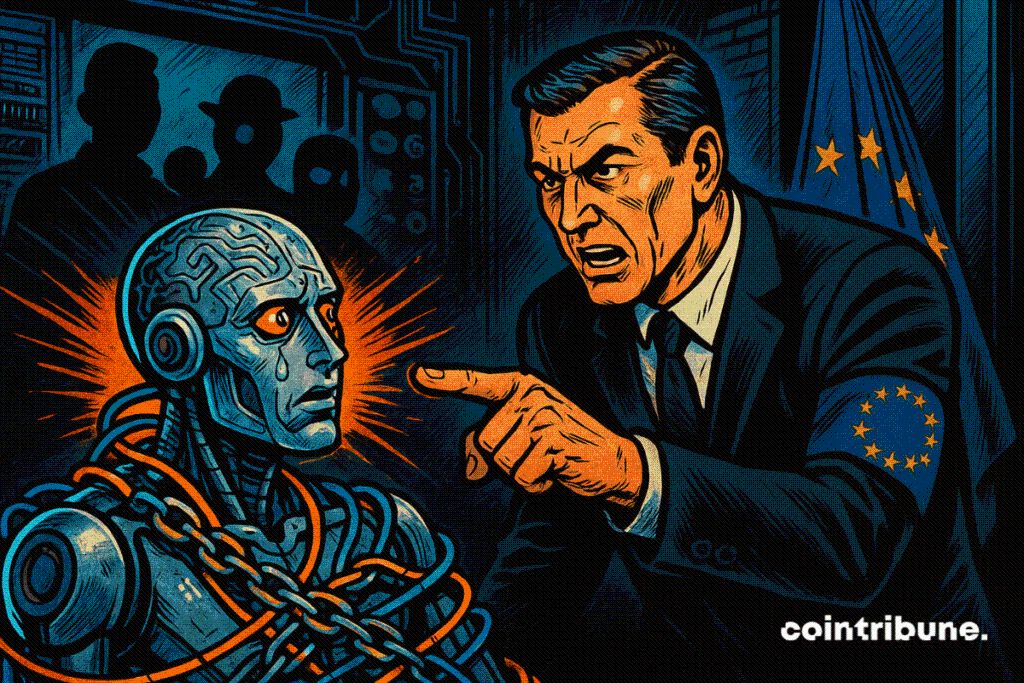Europe Tightens the Noose on AI: Tech Giants in the Crosshairs
The European Union takes a new decisive step in AI regulation. After laying the groundwork in February, Brussels today activates the second part of its AI Act, directly targeting general-purpose models like ChatGPT . A regulatory offensive that divides players in the sector.

In Brief
- The EU strengthens its regulation by targeting generalist AIs, imposing transparency, traceability and respect for copyright.
- Meta rejects these rules, contrary to its more conciliatory competitors facing European regulatory pressure.
- This new framework is part of a growing technological rivalry between Brussels and Washington.
The EU imposes new obligations on AIs like ChatGPT
The countdown is over. This Saturday, the European Union activates the second phase of its AI Act, this time targeting general-purpose artificial intelligence models – like ChatGPT , Claude or Gemini.
This new regulatory chapter extends the device initiated last February 2nd, which laid the foundations for the legal framework of AI by banning certain high-risk practices, such as social scoring or the exploitation of vulnerable people.
Now, requirements are precise and strengthened. Developers of these AIs must ensure respect for copyright, certify the provenance of generated content, and stop massive extractions of personal data. Hate and discriminatory speech must also be proactively filtered.
This rise in European regulatory power takes place in a tense geopolitical context. While the United States favors self-regulation and China accelerates without democratic constraints, Europe bets on a regulated AI.
A stance that could set a precedent worldwide, like the GDPR which imposed itself as an international reference.
Thus, Brussels’ strategy is clear: those who want to do business in Europe will have to respect its rules. A form of disguised digital protectionism aimed at rebalancing power relations with the American tech giants.
Meta in open war against Europe
Unlike Microsoft or Google, who show more conciliation, Meta chooses direct confrontation.
Mark Zuckerberg’s company categorically refuses to submit to European demands, preferring a direct confrontation with Brussels.
This resistance from Meta is explained by huge financial stakes. The new European rules directly threaten the company’s business model, based on the massive exploitation of personal data and the creation of content by artificial intelligence (AI).
Indeed, for Meta, submitting to the AI Act would mean limiting its innovation capacity and giving a competitive advantage to its less scrupulous rivals.
Experts’ opinions vary on the real effectiveness of this regulation. Some see it as a simple communication exercise for companies, allowing them to give themselves a “positive appearance” without major constraints.
Others believe that Europe is playing big in this regulatory battle, even at the risk of seeing American giants desert the European market.
This trench warfare between Meta and Europe perfectly illustrates the growing tensions between European digital sovereignty and American technological hegemony.
A tug-of-war that could redefine the global balances of the digital economy and determine who, between unbridled innovation and regulated ethics, will win the race for AI.
Europe moves forward resolutely, driven by an ideal of ethical governance of artificial intelligence. But this solitary path, between legal constraints and strategic ambitions, could end up isolating the old continent further. The real challenge today is no longer just regulating AI, but doing so without sacrificing innovation or losing technological influence.
Disclaimer: The content of this article solely reflects the author's opinion and does not represent the platform in any capacity. This article is not intended to serve as a reference for making investment decisions.
You may also like
Dogecoin Drops 8% Amid Heavy Market Activity
Insider Whale Takes Large Short Positions on XRP, SOL

Bitcoin ETFs Boost Institutional Investments Amidst Market Changes

REX Shares’ Solana Staking ETF Achieves $143.7M AUM

